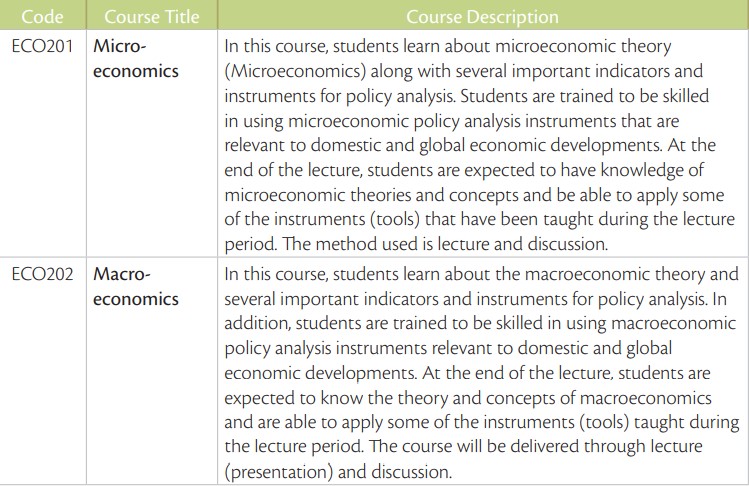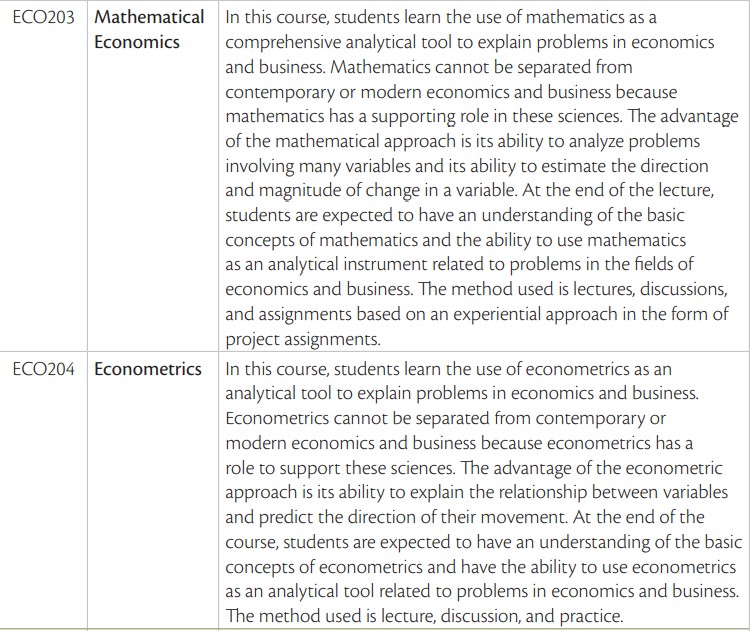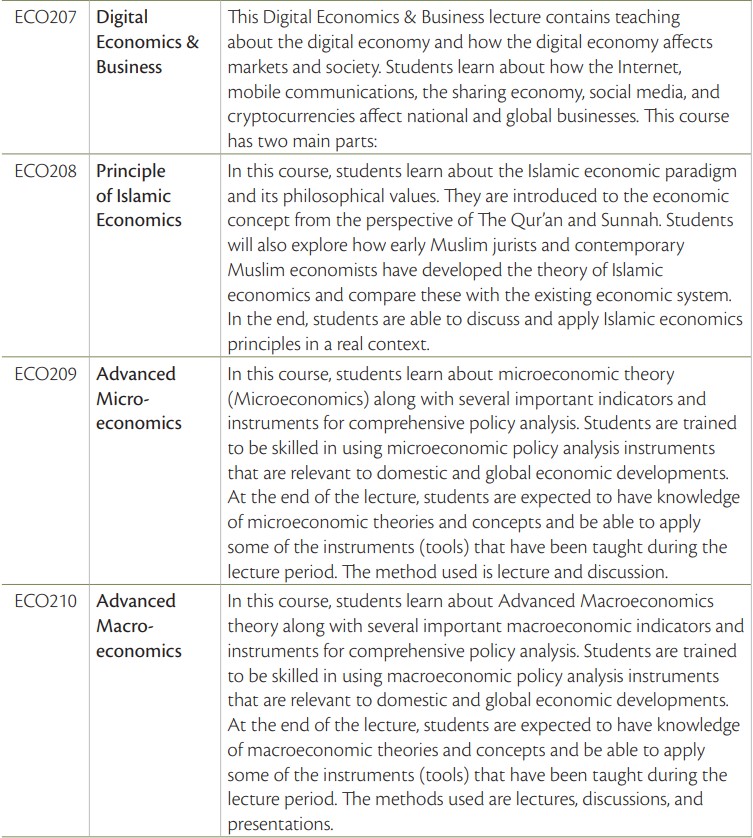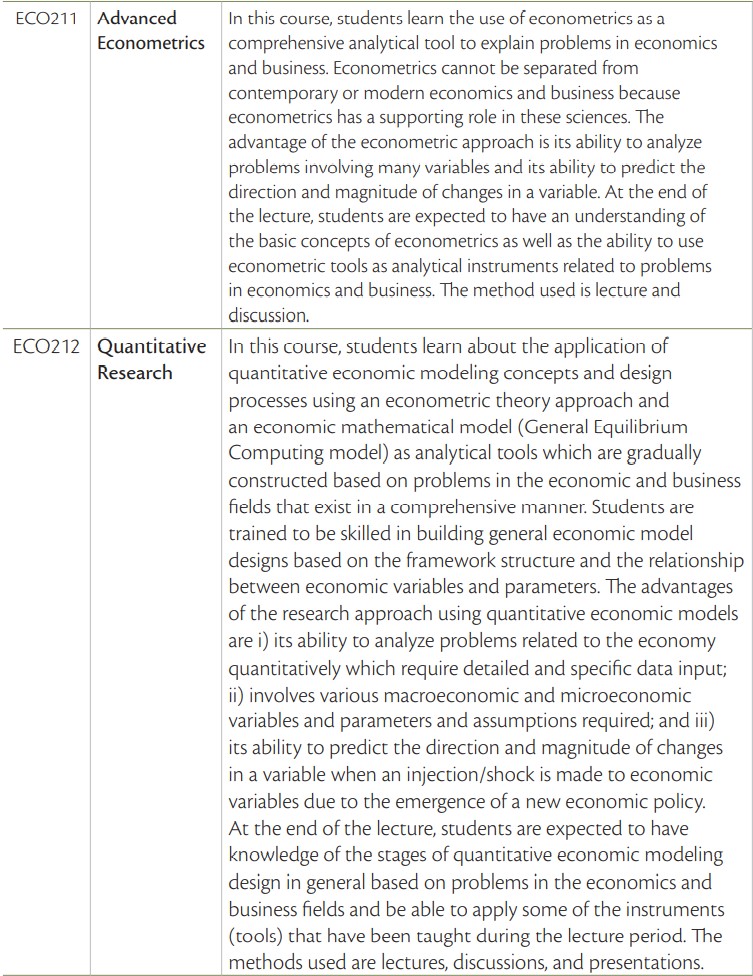Faculty of Economics and Business
Dean of the Faculty of Economics and Business: Prof. Dian Masyita, Ph.D.
The Faculty of Economics and Business of UIII offers studies and research in economics and business with particular topics in Islamic economics and digital transformation. The faculty designed the curriculum for master's and Ph.D. programs to develop intellectual and professional skills as outstanding managers, leaders, and academicians over a lifetime career.
The Faculty of Economics and Business provides holistic and multidisciplinary higher education which aim to develop all capacities of human beings-intellectual in economics, business, society, moral, and technology in an integrated manner. The faculty members will help develop well-rounded individuals to possess critical 21st-century capacities in fields across the humanities, social sciences, professional, and technical fields and an ethic of social engagement such as soft skills and rigorous specialization in a chosen field or fields.
Ability and creativity to apply this knowledge to solve the relationship among religion, economics, business, and technology problems. Ability to conduct research using a robust methodological foundation on the relationship between religion and digital technology consistent with norms and practices in economics and business, including estimating economic and business models using big data, testing hypotheses, forecasting, and interpreting big data.
MA in Economics
The MA in Economics program is designed to provide academic training for students who are interested in studying the dynamics of economic, finance, and business development in Muslim societies across the globe in particular, as well as international communities in general. The MA in Economics program equips students with the advanced knowledge and quantitative skills for an economic, finance, and business analyst in the global society.
The program is also intended to serve as an intellectual platform for future scholars in the fields of economics, finance, and business with special attention being given to the Muslim states and societies. It offers a unique mixture of knowledge that embraces the mainstream approach of positivism and normativism embodied in quantitative and qualitative methodologies and values derived from an in-depth understanding of the Qur’an and Hadith. In addition, students will also be equipped with digital economics knowledge which is the basis for anticipating dynamic changes in the future economic landscape. Thus, the outcomes of the program are more comprehensive and innovative. Graduates of this program are expected to be able to exercise their knowledge of contemporary problems in the business and economic world and respond to the needs of a competitive market in their capacity as academia, researchers, regulators, and practitioners in the field of economics and business in general.
Expected Learning Outcomes/Competency of MA in Economics
Upon the program completion, students are expected to:
- Have advanced knowledge of various approaches and theories in economics,
- Have an excellent understanding of economic, finance, and business development processes in the Muslim World and beyond,
- Demonstrate a good command of relevant research skills in economics, along with competence in conducting the research consistent with the norms and manners of the discipline
- Show the competence to apply their theoretical knowledge to explain the dynamics of economic, finance, and business development in Muslim states and societies and beyond
Degree Requirements
To qualify for the M.A degree, students must complete 36 credits. The credits include foundation, field (core), elective courses, internship opportunities, and a Master’s thesis submission. All of the requirements must be completed within two years (four semesters).
Course Structure
The requirement will be satisfied with the following components:
| Foundation Courses | 12 Credits |
| Core Courses | 12 Credits |
| Elective Courses | 6 Credits |
| Final Assignment (Thesis) | 6 Credits |
Course Description





MFin in Sustainable Finance
The Faculty of Economics and Business offers the program of Master of Finance focused in Sustainable Finance. The study emanates the aspects of professionalism, analysis, research, and implementation of contemporary financial science. The program provides a comprehensive education, combining practical study of the financial industry as well as a deep focus in sustainable development. This program will help enhance and prepare students to excel in the professions related to sustainable finance industries. At the same time, this program also equips students with the ability to cope with the environmental and development challenges today and in the future.
Expected Learning Outcomes/Competency
1. Develop students’ ability to approach complex issues with both analytical and critical thinking skills.
2. To hone students’ skills in transforming abstract concepts into reality, allowing them to confidently and effectively put their ideas into practice.
3. Equipping students with skills to working in diverse environment and collaborate effectively with individuals from various backgrounds and perspectives.
4. Develop students’ understanding of the relationship between religious constructs and realities, fostering sustainable economic development in complex social and religious context.
5. Enhance students’ skills in understanding the transformations in sustainable finance to make long-term decisions considering social, economic, and environmental factors.
Degree Requirements
A student seeking a MFin degree in Sustainable Finance at UIII must complete 39 credits (including thesis) to qualify as a Master of Finance (MFin) in Sustainable Finance. The credits include general, theoretical, methodological, elective, matriculation, and MFin thesis/capstone submission.
Ph.D. in Economics
The Ph.D. in Economics program is designed to prioritize studies and research in contemporary economics, especially relating to the development of theories and applications relevant to megatrend phenomena. and contains values that are closely related to the Muslim community globally. With this background, it is hoped that the Ph.D. in Economics program will be able to produce the best graduates who have analytical and decision-making skills as professional economists in the public and private sectors. The Ph.D. in Economics program offers a strong and productive academic culture where students from various countries are able to interact with experts, scientists, and practitioners from various countries who have had brilliant careers in the world of economic studies.
Expected Learning Outcomes/Competency of Ph.D. in Economics
- Have advanced knowledge of various approaches and theories in economics to produce high-quality research for both academic and non-academic settings.
- Have an excellent understanding of economic, finance, and business development processes in the Muslim World and beyond to identify complex questions and to find strategic solutions,
- Demonstrate an outstanding command of relevant research skills in economics, along with competence in conducting research consistent with the norms and manners of the discipline
- Show the competence to apply their theoretical knowledge to explain the complexities and dynamics of economic, finance, and business development in Muslim states and societies and beyond.
Ph.D. Degree Requirement
A student seeking a Ph.D. degree in Economics at IIIU must complete 49 credits (including a dissertation) to qualify as a Doctor of Philosophy (Ph.D.) in Economics. The credits include general courses, core courses, methodologies, and a Ph.D. dissertation submission.
Course Structure
The requirement will be satisfied with the following components:
| General Course | 3 Credits |
| Core Courses | 15 Credits |
| Methodologies | 6 Credits |
| Ph.D. Dissertation | 25 Credits |
Career Path
The academic training at the MA and Ph.D. in Economics programs at the UIII is intended to equip students with the theoretical and empirical foundation to help them advance their careers in academia, international organizations, central bank, financial and banking sector institutions, civil society organizations/NGO/research institute, diplomatic world and government sectors, journalism, and also private sectors that increasingly are in need of economic, finance, and business development understanding of the environment in which they are operating.
Economics and Business Program Descriptions
To learn more about our program, click here.
List of Lecturers and Researchers
To see the list of lecturers from the Faculty of Economics and Business, click here.